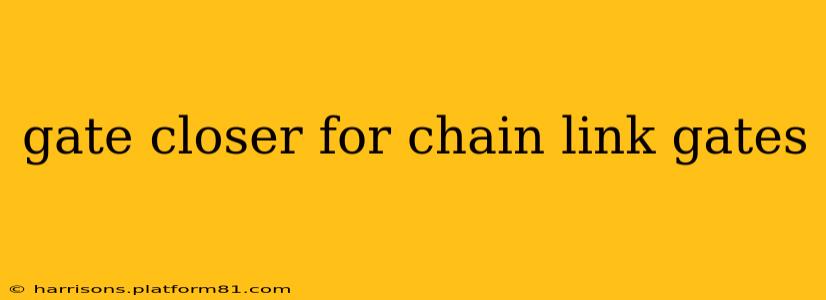Chain link gates, while practical and affordable, can be a nuisance if left to swing freely in the wind or slam shut unexpectedly. A gate closer provides a simple solution, ensuring safety and extending the life of your gate. This guide explores the various types of gate closers available for chain link gates, helping you choose the right one for your needs.
What are the different types of gate closers for chain link gates?
There are several types of gate closers suitable for chain link gates, each with its own advantages and disadvantages:
-
Hydraulic Gate Closers: These closers use hydraulic fluid to control the closing speed, offering smooth, controlled closure and preventing slamming. They're generally more durable and long-lasting than spring-loaded closers, but also more expensive. Hydraulic closers are ideal for heavier gates or gates in high-wind areas.
-
Spring-Loaded Gate Closers: These are simpler and cheaper than hydraulic closers. They rely on a spring mechanism to close the gate. While effective for lighter gates, they can slam shut, potentially damaging the gate or causing injury. Spring-loaded closers are best for gates that experience minimal wind exposure.
-
Self-Closing Hinges: These hinges incorporate a spring mechanism within the hinge itself, providing a self-closing action. They are a less obtrusive option than separate gate closers, but their closing force may be less adjustable and they might not be suitable for heavier gates.
-
Electric Gate Closers: For enhanced security and convenience, electric gate closers offer remote control operation. These are generally more expensive and require professional installation, but they are ideal for high-security areas or gates with limited accessibility.
What are the factors to consider when choosing a gate closer?
Selecting the right gate closer depends on several factors:
-
Gate Weight: Heavier gates require closers with higher closing force ratings. Always check the closer's specifications to ensure it's suitable for your gate's weight.
-
Gate Size: Larger gates naturally require more closing force. Consider both height and width when selecting a closer.
-
Wind Exposure: Gates in windy locations need closers with stronger holding power to prevent the gate from being blown open. Hydraulic closers are often preferred in these situations.
-
Budget: Gate closers range widely in price. Consider your budget and weigh the cost against the features and durability of different options.
-
Ease of Installation: Some closers are easier to install than others. If you're not comfortable with DIY projects, consider hiring a professional installer.
How do I install a gate closer for a chain link gate?
Installation varies depending on the type of closer. Generally, it involves attaching the closer to the gate and the gate post using appropriate hardware. Consult the manufacturer's instructions for specific installation details. Always ensure the closer is securely fastened to prevent it from becoming detached or damaged. Incorrect installation can lead to malfunction or injury.
What is the best gate closer for a chain link gate?
There's no single "best" gate closer. The ideal choice depends on your specific needs and circumstances. Consider the factors outlined above – gate weight, size, wind exposure, budget, and ease of installation – to determine the most suitable option. Consulting with a hardware professional can also help you make an informed decision.
How much does a gate closer cost?
The cost of a gate closer varies depending on the type, brand, and features. Spring-loaded closers are generally the most affordable, while hydraulic and electric closers are more expensive. Expect to pay anywhere from a few tens of dollars to several hundred dollars, depending on your chosen closer.
How do I maintain my gate closer?
Regular maintenance will extend the lifespan of your gate closer. This may include lubricating moving parts, checking for damage, and ensuring proper alignment. Always refer to the manufacturer's instructions for specific maintenance recommendations. Ignoring maintenance can lead to premature failure and potential safety hazards.
By carefully considering these factors and selecting the appropriate gate closer, you can ensure your chain link gate closes smoothly, safely, and reliably for years to come.
